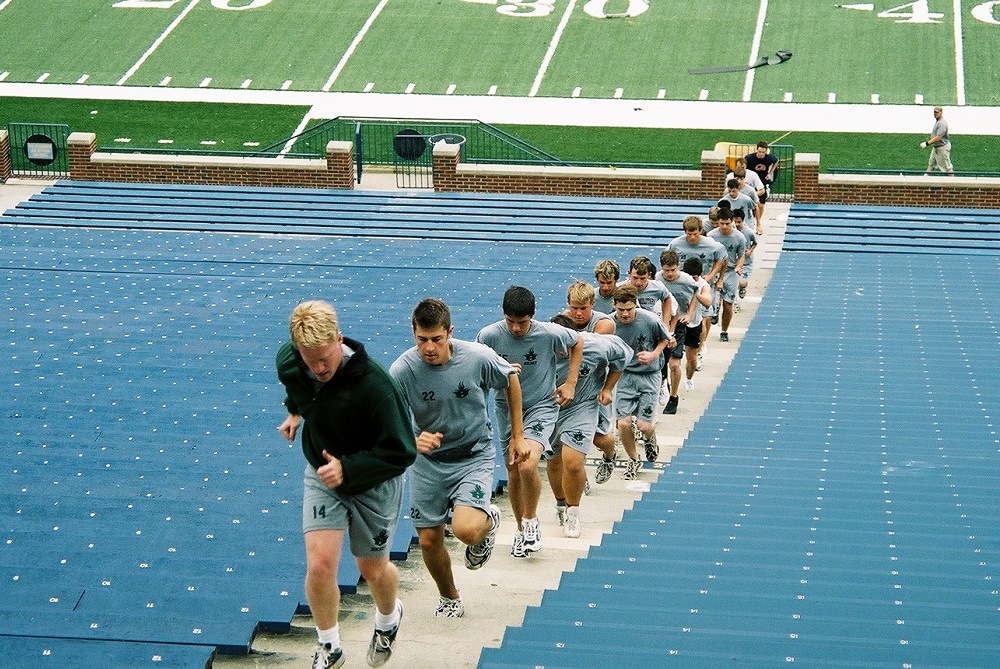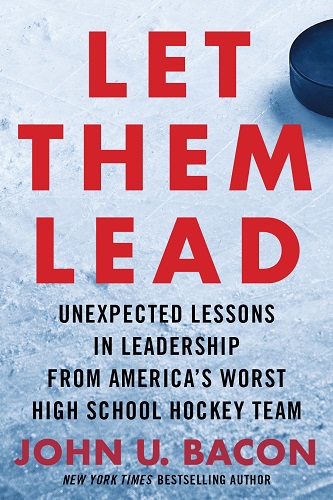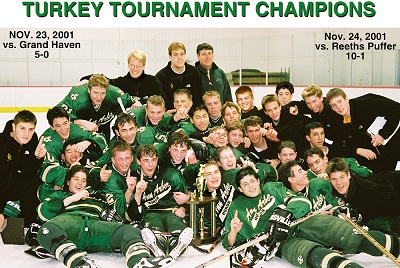
'Let Them Lead' Shows How Through Coach's Eyes During Huron Hockey's Rise
By
John Johnson
MHSAA Communications Director emeritus
September 17, 2021
Over 30 years of riding shotgun with Jack Roberts, I quickly learned to respond whenever I was asked about the lifetime values of high school sports, with a laundry list with these two items at the top:
 Hard Work - Team Work
Hard Work - Team Work
In reviewing the newly-released book by Ann Arbor’s own John U. Bacon – “Let Them Lead, Unexpected Lessons in Leadership From America’s Worst High School Hockey Team” – everything flows from those two values all of us in prep sports hold near and dear.
I met John in 1997 when he was a sportswriter at The Detroit News, where he was covering his high school alma mater – Ann Arbor Huron – in the Class AA Football Final at the Pontiac Silverdome. Just a few years later, the story that holds the detailed leadership lessons together in this book would begin when he was named the head hockey coach at Huron, inheriting a team that finished the previous season 0-22-3.
Building everything he put into that team with the premises that no one would outwork the River Rats, and as a team they supported each other, Bacon’s charges rose from not even being listed in the national team winning percentage listings - about 1,000 schools - prior to his arrival, to a top-five spot in the state’s rankings in his fourth year.
Along the way, the buy-in to the leadership themes made Huron Hockey cool again at the school and earned the River Rats the respect of their opponents. The values being taught gave value to the program. In making it hard to be a part of the team, more kids wanted to join it. They valued the experience. They led and supported themselves on and off the ice.
With the book being written nearly 20 years after the events it is based on, Bacon solicited input from a variety of players to verify the accuracy of events, and they flooded him with additional stories of their own from their playing days and adult lives which illustrated the leadership skills they learned in the locker room, training sessions, practices and games.
 Like any book on leadership, you forge through those details about applying certain things in the workplace, but what keeps you engaged is the team. You’ve gotten hooked by the River Rats, and you just have to see how this thing turns out.
Like any book on leadership, you forge through those details about applying certain things in the workplace, but what keeps you engaged is the team. You’ve gotten hooked by the River Rats, and you just have to see how this thing turns out.
This feel-good tome resonates whether you’re a coach or a corporate type. It’s an easy read, and you'll take a lot from it.
John U. Bacon did play ice hockey for the River Rats, owning the distinction for playing the most games at the time he graduated – but also never scoring a goal. His writing, teaching and speaking career have produced seven books which have been national best sellers; he’s an established historian on a variety of topics – including the football program at University of Michigan, where he currently teaches; and he’s in demand as a public speaker.
Let Them Lead is published by Houghton Mifflin Harcourt, and available through a variety of bookstores.
PHOTOS (Top) Huron's hockey team runs the Michigan Stadium stairs in 2002. (Middle) "Let Them Lead" tells the story of the program's transformation. (Below) The River Rats celebrate their Turkey Tournament championship in 2001. (Photos courtesy of John U Bacon.)

Program Priorities
January 10, 2014
Many school districts face more requests from their constituents for sports programs than they have the resources to accommodate, so they are forced to make very difficult decisions. For three decades, when I’ve been consulted, I have offered and stood by this advice.
First, I advance the premise that if the activity is educational, there is just as much potential for the education to occur at the junior high/middle school and subvarsity levels as at the varsity level. Just as we would not discriminate against one race or gender, we should not disadvantage one age or ability level. In fact, with a little less pressure to win, it is likely to see more education at subvarsity levels and more reason to sponsor them.
Second, I advocate the position that schools should avoid sponsorship of any activity for which a qualified head coach cannot be secured. Qualified personnel are, in order of priority:
-
a teacher within the building who has current CPR certification and completed CAP.
-
a teacher within the district who has current CPR certification and completed CAP.
-
a teacher in another district who has current CPR certification and completed CAP.
-
a certified teacher from the community who has current CPR certification and completed CAP.
-
a non-certified person who has current CPR certification and completed CAP.
I urge schools not to descend lower than this for program leadership. Coaches are the delivery system of the education in educational athletics; they are the critical link in the educational process. More problems occur than are worth the effort if the program is in the hands of an unqualified coach.
Next, I urge that schools rank sports on the basis of cost per participant, and give higher priority to sports that spread funds over the greatest number of participants.
Next, I urge that schools place lowest in priority the sports that cannot be operated on school facilities and create transportation, supervision and liability issues, and give higher priority to those conducted at or very near the school.
Next, I urge that schools place lowest in priority the sports which are most readily available in the community, without school involvement. If resources are precious, then duplicating school programs should be a low priority; doing what the community can’t do or doesn’t do should be given a much higher priority.
While I’m a fan of school sports, I recognize that an athletic program has as much potential to do harm as to do good. Programs without qualified coaches that are conducted for small numbers of students at remote venues and without comprehensive school oversight and support may create more problems for schools than the good they do for students.
Bare bones budgeting will require brutally honest assessments based on priorities like these.

